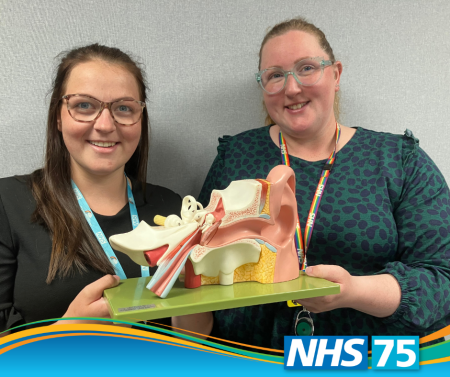Publish date: 16 June 2023

The Covid emergency severely disrupted healthcare – not least stopping many patients attending hospital for routine appointments during the early months of the pandemic.
As the pandemic progressed, NHS teams had to come up with new ways of giving patient care. One of them was audiology at Blackpool Teaching Hospitals.
“Audiology activity came to a halt at the start of the pandemic and for obvious reasons patients were staying away from their GPs,” said Audiology Manager Emma Walsh. “This meant when the world started to return to normal, waiting times went through the roof.”
Restarting routine care such as fitting hearing aids and replacing batteries needed a fresh approach, especially as Covid restrictions still had months to run.
The team began to develop new ways of working, including delivering hearing aids to patients, so they could start their rehabilitation while they were staying safe at home. Instructions were provided online through the Trust website for those who wanted to access their care this way. As GP surgeries were closed to the general public, batteries were posted rather than having to be collected.
The team historically offered a drop-in repair service for hearing aid users at various sites across the Fylde coast, which they were unable to maintain due to social distancing. This was replaced by an appointments system – “patients have told us that they much prefer it this way, as now there’s very little waiting”, said Emma.
Modern digital hearing aids also offer more changes for patients, there are plans in place to offer remote care, where hearing aid updates can be sent to a patient’s smartphone and uploaded to their device without having to visit the department.
The team is also working with B.Digital, the Trust digital transformation team, to change the vestibular service for patients with balance issues. Questionnaires are being developed for GP surgeries, as well as patients, so they are able to direct patients to the right care in the right place more quickly, and rehabilitation is able to start sooner.
“Due to these changes during the pandemic many patients have learned self-care for their hearing aid with the information and support we’re able to provide,” said Emma.
“Of course, we’re always here for those patients who can’t, for whatever reason, do it themselves but for many people this approach is much more convenient.”
The team’s success is also reflected in much shorter waits for care. In the last six months, the number of patients waiting for an appointment has been reduced by more than half.



